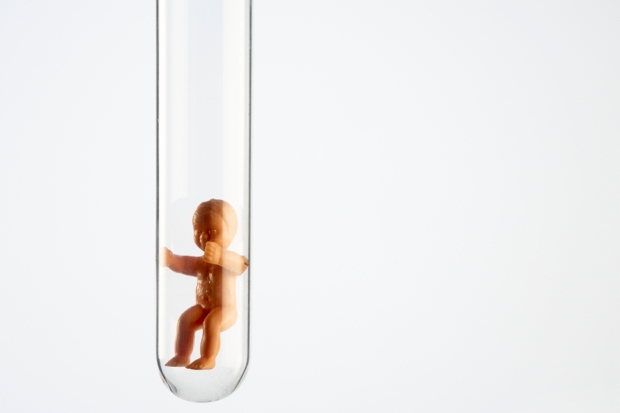There doesn’t seem much doubt about which way the Commons vote today on ‘three-parent babies’ will go, does there? A combination of dismissive metaphors, characteristically British sentimentalism and morally astigmatic scientists seems likely to do the trick. Today in the Telegraph, Lord Winston, IVF supremo, opined that the thing was no more problematic than a blood transfusion. In the Times, Matt Ridley, dismissed the importance of mitochondrial donation (the ‘third parent’ bit) as no more important to us than our gut bacteria. A Daily Mail journalist on the Westminster Hour last night brusquely observed that the technique was rather like changing a spare tyre. Add to the mix a photogenic would-be beneficiary of the technique in the papers, plus the intervention of the Catholic and Anglican bishops against the proposal, and hey, the issue is now science (and compassion) versus religion. And we know how that’ll go.
Yet the technique does raise real and important ethical issues. It involves creating two embryos, from one of which the nucleus is removed, in order to make way for the nucleus of the other. So, in cases where the mother suffers from a mitochondrial disorder, this means her mitochondria can be excluded from her future offspring by implanting her nucleus into the embryo of the third parent. And although we may be talking about a tiny minority of the future baby’s DNA – 37 out of about 2,000 genes – they’re not entirely insignificant. They govern the efficiency with which our metabolisms function, or how we process energy, which is rather an important element of our physiology. Besides which, mitochondria make up about half of the biological make up of a cell. What’s more the nucleus is not some sort of separate entity from the rest of the fertilised ovum; it communicates with the mitochondria and vice versa. So the spare tyre analogy doesn’t work. The contribution of the third parent matters.
What was interesting when I came to write about this subject a couple of years ago was how reluctant distinguished scientists were to talk on the record about their reservations. Expressing doubts about the ethics or efficacy of the technique would brand them as being on the pro-life end of the spectrum, which isn’t a career-enhancing option. The European Convention on Human Rights allows modifications to the human genome only if its aim is ‘not to introduce any modification in the genome of any descendants’. But that’s just what this bill is designed to introduce: modifications to the germ line of a child for generations to come. Lord Winston does nail part of the objection to the technique – namely, it instrumentalises a human embryo for the benefit of others – but he dismisses this out of hand, as you’d expect from someone in his line of business. But we shouldn’t buy into one emotive argument, that this would save children from lives of great suffering: it doesn’t actually benefit any living children at all, so much as allowing the creation of other children who would be free of mitochondrial disease.
It would be nice if this debate were indeed honestly conducted, as being about the genetic modification of the human embryo. But given the sentimentalism and muddled moral thinking of Brits, including legislators, I don’t expect that to cut any ice at all.
PS It doesn’t help the debate that the CofE managed to field such a useless spokesman to articulate concerns about the bill in the person of the Bishop of Swindon, Dr Lee Rayfield. Observing on the Today programme this morning that ‘this was not the Church of England’s finest hour,’ Rayfield said that their worries were simply about the safety of the procedure: ‘if the safeguards are there, the Church of England will be behind this.’ Really? Granted there are safety concerns, including the possibility that individuals born from the technique may be more prone to cancer, as a report in the Telegraph suggests, but the real issue is one of principle. It’s about the creation of a genetically modified human being, even if the genetic modification is all to do with the creation of babies free of mitochondrial disease. But however sad the plight of people with this condition who want children of their own, it doesn’t trump the argument that creating a three-parent baby is a drastic step, which hasn’t been approved by any other administration anywhere in the world, for good reason. Modifying the germline for generations to come isn’t just tinkering at the edges. Shame the CofE couldn’t come up with a bishop with enough gumption to say so.







Comments